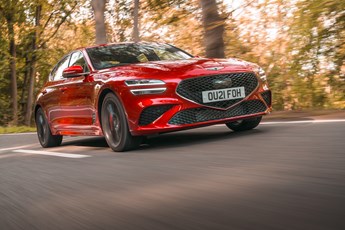
The start point for the best source of fleet information |
First drive: Genesis G70
Date: 24 November 2021 | Author: Sean Keywood

|
|
||||||||||||||||||
Genesis itself may be backing its GV70 SUV as having the greatest fleet appeal from its initial UK model line-up, but more traditionally-minded fleet managers and drivers will surely be taking notice of the car tested here, the G70. It's a four-door saloon pitched at the age-old fleet heartland segment, ready to do battle with titans such as the BMW 3 Series and Mercedes Benz C-Class.
Perhaps surprisingly, the G70 may offer more to tempt previous drivers of the former German car than the latter. Although, with Genesis's status as a new premium brand from Hyundai, it might seem the safe option would be to take a comfort-first approach to driving dynamics. In fact, especially with the Sport Line equipment grade tested here, it's clearly got more interest in taking on the 3 Series as a fun-to-drive sports saloon. Evidence of this approach includes the ride, which is fairly firm, meaning bumps and ruts in the road are fairly noticeable both around town and at A-road speeds, not helped by hard-ish seats, although good damping means unexpected back-road dips and bumps are undramatic. In further good news, this set-up allows the car to exploit the dynamic advantages of its rear-wheel drive layout. It feels poised and nicely balanced on twisty roads, with only unfeelsome steering spoiling the experience a bit.
As with the rest of Genesis's initial UK line-up, there are no electrified powertrains available, which the brand has conceded will limit its early fleet appeal. Instead, there's a choice of a 200hp diesel engine, or a 197hp or 245hp petrol. The latter, tested here, is refined most of the time, then when called upon to deliver (impressively strong) acceleration with the 'sport' driving mode selected provides a loud throaty engine note, which although perhaps not the most sophisticated soundtrack is rather good fun. Unsurprisingly, the petrol engines consume more fuel than the diesel, however, all fall into the top 37% BIK company car tax bracket.
Both engines are paired with an excellent eight-speed automatic gearbox, which shifts smoothly and offers no hint of annoying delays or hesitation at junctions.
Interior material quality is very good, although from an aesthetic point of view we thought the red seatbelts fitted to our test car were a little over the top - more hot hatch than sports saloon. The 10.25in touchscreen is slick and responsive, and the number of physical controls provided, especially for the air conditioning system, is welcome. On the minus side, rear-seat legroom is OK at best for the segment, while headroom might be tight for tall passengers, and a 330-litre boot is disappointingly small compared with rivals' offerings, such as the 480-litre boots found with the 3 Series and Audi A4 saloons, and the 455-litre boot on offer with the C-Class saloon.
A look at the cost sheet reveals more bad news for the G70, in the form of low residual values, while the German cars are also all more fuel efficient with equivalent engines, and in the case of the BMW and Mercedes incur cheaper BIK payments. However, the G70 is at least the cheapest of the bunch on P11D, which means on a cost-per-mile basis it does slightly undercut the A4, although the C-Class has a slight advantage here and the 3 Series comes out a fair way ahead. For these among other reasons, although the G70 does plenty of things well, it's hard to see it as more than a niche choice for now.
Genesis G70 Sport Line 2.0T 8AT
P11D: £39,080
Residual value: 31.4%
Depreciation: £26,797
Fuel: £10,428
Service, maintenance and repair: £3,719
Cost per mile: 68.24p
Fuel consumption: 35.4mpg
CO2 (BIK %): 193g/km (37%)
BIK 20/40% a month: £241/£482
Luggage capacity: 330 litres
Engine size/power: 1,998cc/245hp
Verdict |
6/10 |
|||
 |
|
 |
|
|










